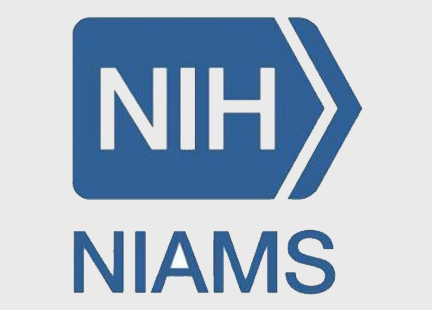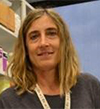
STAR main page
Overview of the STAR Awards:
The NIAMS STAR program provides supplemental funding for early-career stage investigators who have renewed their first NIAMS-funded R01 grant. The supplement enables these scientists to pursue innovative and high-risk research within the broader scope of a current NIAMS-funded, peer-reviewed research project. It also helps investigators to expand a single, structured research project into a broader multi-faceted research program. In 2018, five investigators received NIAMS STAR supplements. Previously, NIAMS funded three STAR awards in 2015, four in 2016, and four in 2017. An announcement to reissue the NIAMS STAR program for 2019 and beyond was published on September 7, 2018.
2018 STAR Awardee Profiles:
 Maria Almeida, Ph.D., is a professor of internal medicine at the University of Arkansas for Medical Sciences. She leads an NIAMS-funded research project to identify the means by which aging causes bone loss. The maintenance of bone mass in animals and humans relies on a balance between the functions of proteins that control both bone-resorbing and bone-forming cells. By studying the age-dependent changes in these functions, Dr. Almeida’s team hopes to better understand how aging decreases bone mass. The STAR award funding will allow her group to identify new drugs that can promote bone formation while limiting off-target effects. These drugs may prove useful to treat age-related osteoporosis and other degenerative disorders of aging.
Maria Almeida, Ph.D., is a professor of internal medicine at the University of Arkansas for Medical Sciences. She leads an NIAMS-funded research project to identify the means by which aging causes bone loss. The maintenance of bone mass in animals and humans relies on a balance between the functions of proteins that control both bone-resorbing and bone-forming cells. By studying the age-dependent changes in these functions, Dr. Almeida’s team hopes to better understand how aging decreases bone mass. The STAR award funding will allow her group to identify new drugs that can promote bone formation while limiting off-target effects. These drugs may prove useful to treat age-related osteoporosis and other degenerative disorders of aging.

Elena Ezhkova, Ph.D., is an associate professor of cell, developmental, and regenerative biology at Icahn School of Medicine at Mount Sinai. Dr. Ezhkova is the principal investigator of an NIAMS research grant that studies the mechanisms that give rise to Merkel cells—the mechanosensory cells that are located in the skin and mediate light touch sensations for texture and shape recognition. Uncovering the mechanisms of Merkel cell formation will improve understanding of the sensory functions of the skin and might offer clues about the processes that lead to Merkel cell carcinoma, a deadly skin disease with no current effective treatment. The STAR award funding will enable Dr. Ezhkova’s team to identify key Merkel cell-specific factors that regulate the differentiation of these cells.
 Mayumi Ito, Ph.D., is an associate professor of dermatology at the New York University School of Medicine. Dr. Ito is the principal investigator of an NIAMS-funded research project to understand how Wnt signaling regulates hair follicle melanocyte stem cells, which give rise to melanocytes, the specialized cells that produce and contain the hair-darkening pigment called melanin. The Wnt signaling pathways are a group of signal transduction pathways that enable signal molecules to pass information between cells through receptors on the cell surface. Although it was previously believed that melanocytes only exist in the hair follicles, Dr. Ito’s team has recently identified a subpopulation of skin melanocytes that displays active Wnt signaling and persists long-term within the epidermis, the outermost layer of the skin. Pigmentation diseases, including melanoma, the most aggressive form of skin cancer, arise from these epidermal melanocytes. The findings suggest that these skin melanocytes may actually be a previously unknown epidermal melanocyte stem cell population. The STAR award funding will enable Dr. Ito’s team to definitively address whether melanocyte stem cells are present within the skin epidermis and begin to define how those stem cells are regulated.
Mayumi Ito, Ph.D., is an associate professor of dermatology at the New York University School of Medicine. Dr. Ito is the principal investigator of an NIAMS-funded research project to understand how Wnt signaling regulates hair follicle melanocyte stem cells, which give rise to melanocytes, the specialized cells that produce and contain the hair-darkening pigment called melanin. The Wnt signaling pathways are a group of signal transduction pathways that enable signal molecules to pass information between cells through receptors on the cell surface. Although it was previously believed that melanocytes only exist in the hair follicles, Dr. Ito’s team has recently identified a subpopulation of skin melanocytes that displays active Wnt signaling and persists long-term within the epidermis, the outermost layer of the skin. Pigmentation diseases, including melanoma, the most aggressive form of skin cancer, arise from these epidermal melanocytes. The findings suggest that these skin melanocytes may actually be a previously unknown epidermal melanocyte stem cell population. The STAR award funding will enable Dr. Ito’s team to definitively address whether melanocyte stem cells are present within the skin epidermis and begin to define how those stem cells are regulated.
 Tatsuya Kobayashi, M.D., Ph.D., is an assistant professor of medicine at Massachusetts General Hospital. He leads an NIAMS-funded research project to define the role and mechanism of action for microRNAs involved in skeletal development and bone homeostasis. Micro-RNAs are short RNAs that regulate gene expression. In previous studies, Dr. Kobayashi’s efforts were focused on revealing the cellular and molecular mechanisms that mediate the action of micro-RNAs belonging to the miR-17-92 cluster. These miR-17-92 micro-RNAs are abundantly expressed in stem/progenitor cells and implicated in the maintenance of these cells. Mutations in the miR-17-92 micro-RNA gene have been linked to human congenital skeletal diseases. The STAR award will enable Dr. Kobayashi to expand his work to study miR-140, another micro-RNA that, when mutated, has been associated with a novel human skeletal dysplasia. This research offers a promising avenue for identifying mechanisms of bone diseases and developing new treatment strategies.
Tatsuya Kobayashi, M.D., Ph.D., is an assistant professor of medicine at Massachusetts General Hospital. He leads an NIAMS-funded research project to define the role and mechanism of action for microRNAs involved in skeletal development and bone homeostasis. Micro-RNAs are short RNAs that regulate gene expression. In previous studies, Dr. Kobayashi’s efforts were focused on revealing the cellular and molecular mechanisms that mediate the action of micro-RNAs belonging to the miR-17-92 cluster. These miR-17-92 micro-RNAs are abundantly expressed in stem/progenitor cells and implicated in the maintenance of these cells. Mutations in the miR-17-92 micro-RNA gene have been linked to human congenital skeletal diseases. The STAR award will enable Dr. Kobayashi to expand his work to study miR-140, another micro-RNA that, when mutated, has been associated with a novel human skeletal dysplasia. This research offers a promising avenue for identifying mechanisms of bone diseases and developing new treatment strategies.
 George G. Rodney Jr., Ph.D., is an associate professor of molecular physiology at Baylor College of Medicine. Dr. Rodney is the principal investigator of an NIAMS research grant that aims to investigate novel therapeutic agents for Duchenne muscular dystrophy. One aspect of his research focuses on lysosomes, which are spherical vesicles found inside cells that degrade various kinds of biomolecules. Defects in lysosomal function are implicated in many severe human diseases, including disorders of the immune system, cancer, and muscle myopathies. The STAR award funding will enable Dr. Rodney’s team to improve understanding of the mechanisms involved in a fundamental role of the lysosome as a signaling hub in skeletal muscle.
George G. Rodney Jr., Ph.D., is an associate professor of molecular physiology at Baylor College of Medicine. Dr. Rodney is the principal investigator of an NIAMS research grant that aims to investigate novel therapeutic agents for Duchenne muscular dystrophy. One aspect of his research focuses on lysosomes, which are spherical vesicles found inside cells that degrade various kinds of biomolecules. Defects in lysosomal function are implicated in many severe human diseases, including disorders of the immune system, cancer, and muscle myopathies. The STAR award funding will enable Dr. Rodney’s team to improve understanding of the mechanisms involved in a fundamental role of the lysosome as a signaling hub in skeletal muscle.
* This page was updated in August 2021 to include Dr. Ezhkova whose name was inadvertently omitted during the original posting.
Background
To view profiles for the 2015 STAR awardees, visit the 2015 announcement for the STAR program.
To view profiles for the 2016 STAR awardees, visit the 2016 announcement for the STAR program.
To view profiles for the 2017 STAR awardees, visit the 2017 announcement for the STAR program.
For more information, please see the STAR funding opportunity announcement and the December 2014 letter from the NIAMS Director announcing the program.
